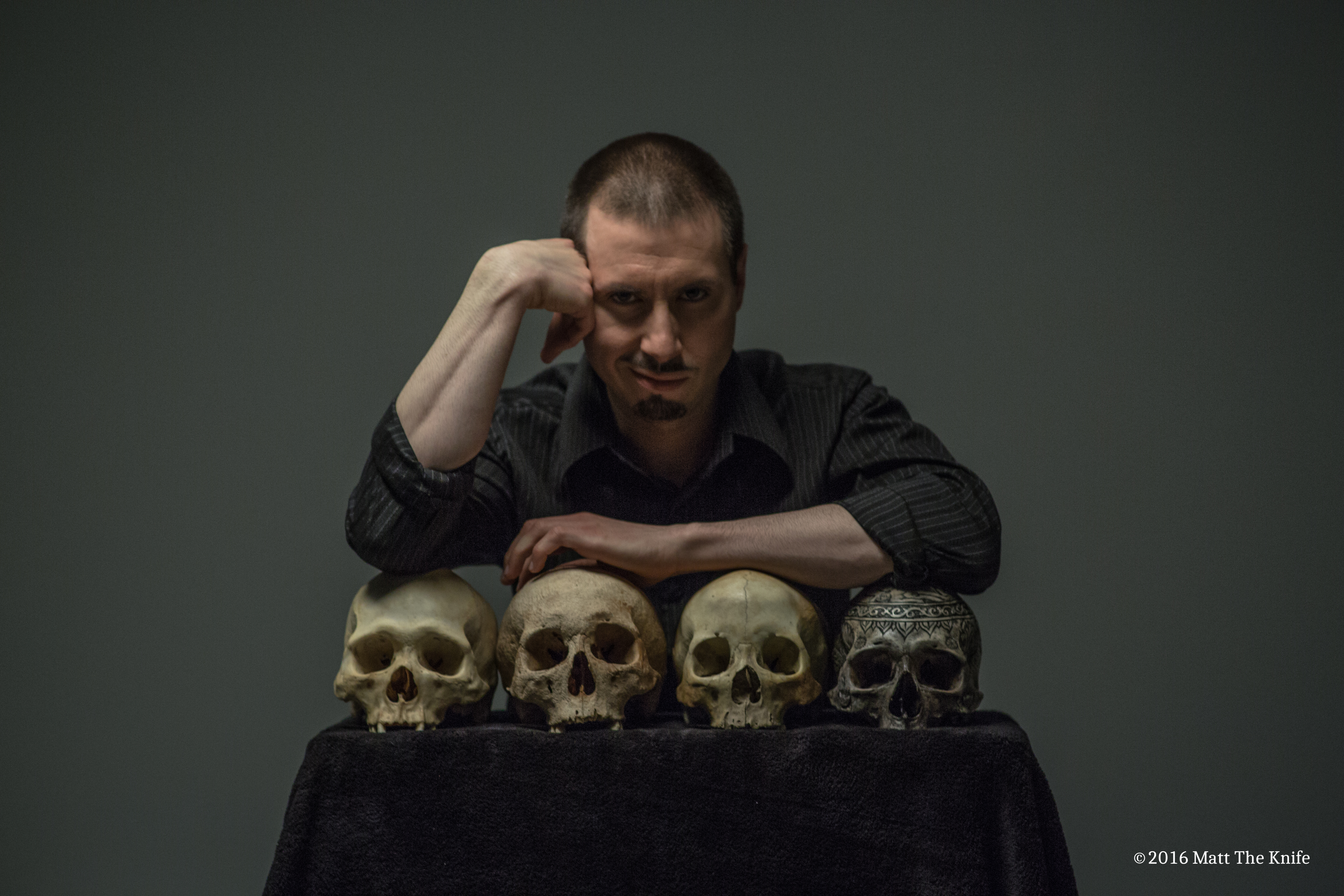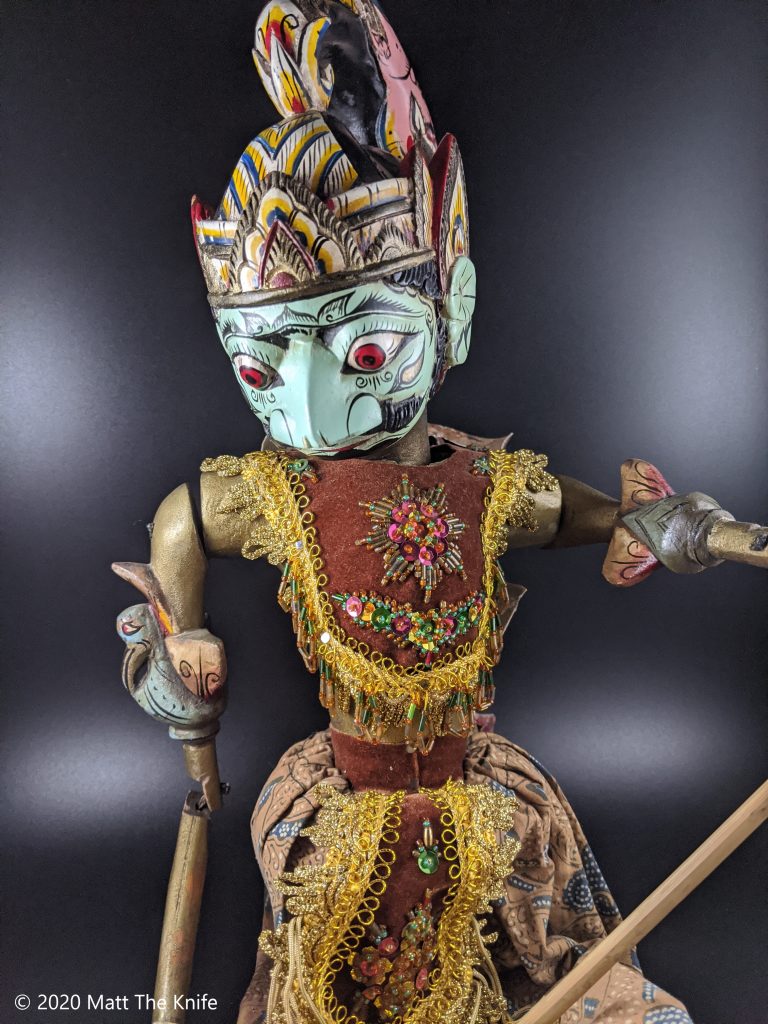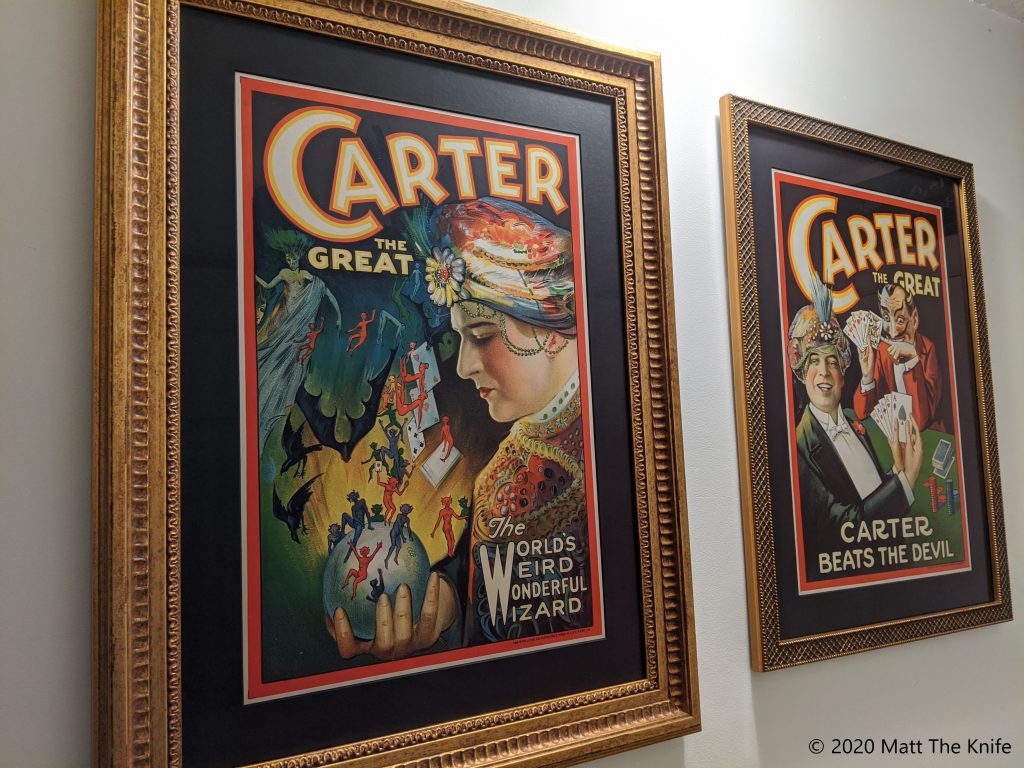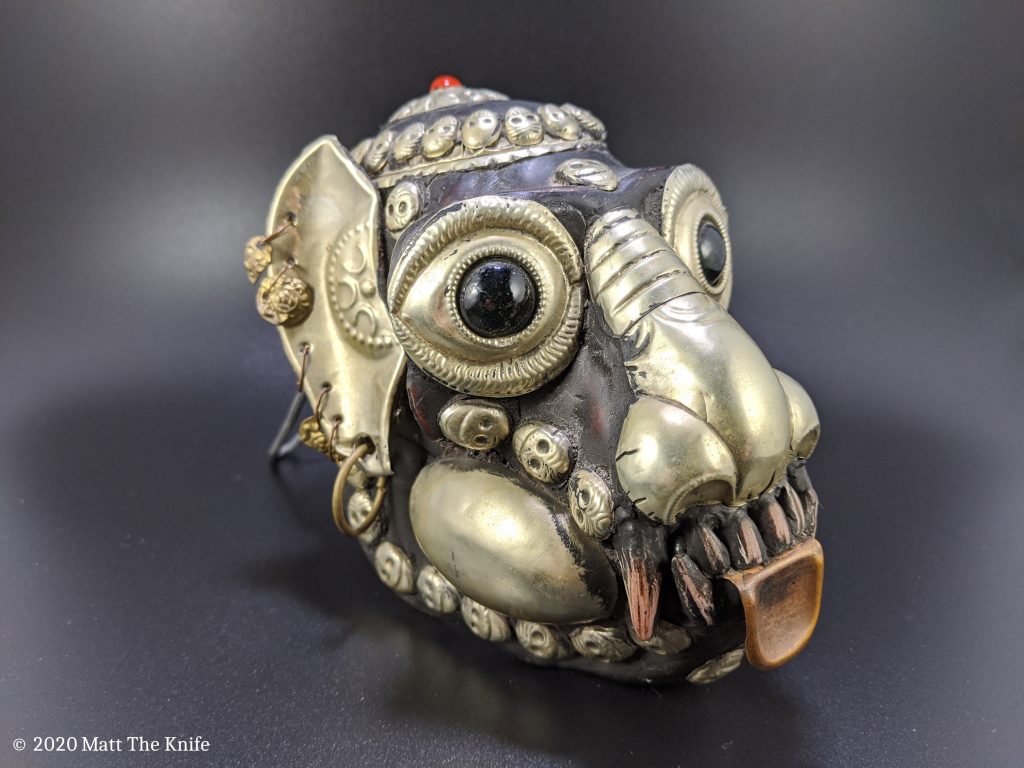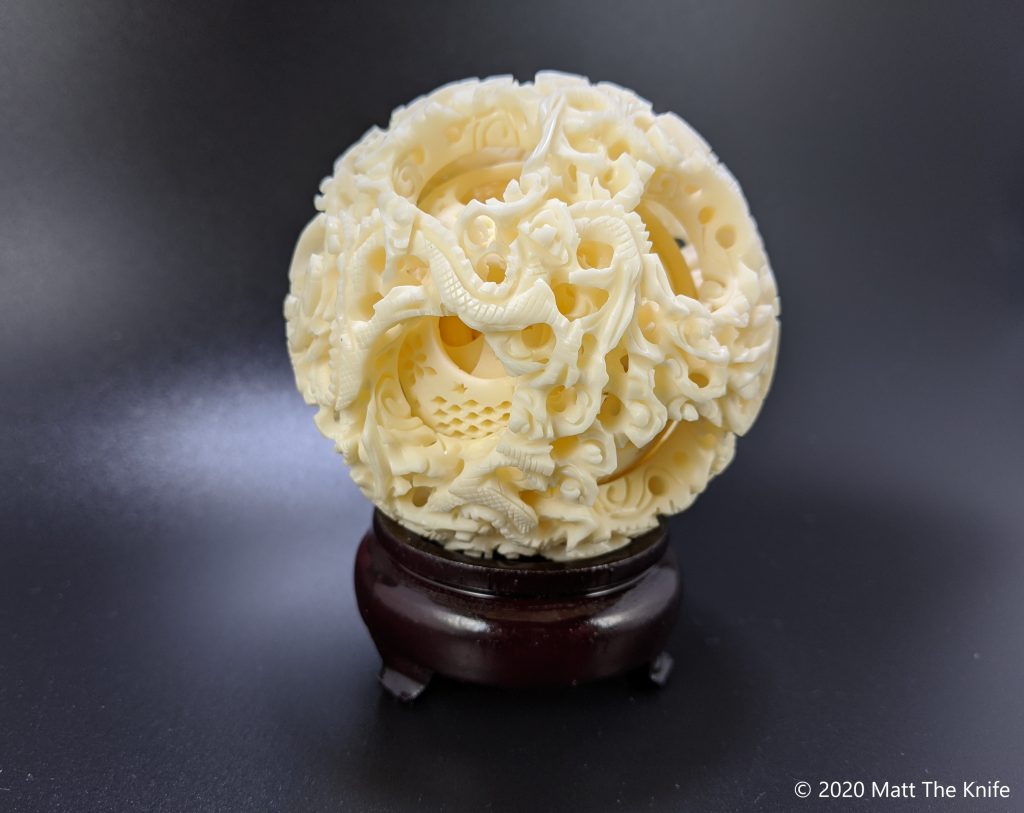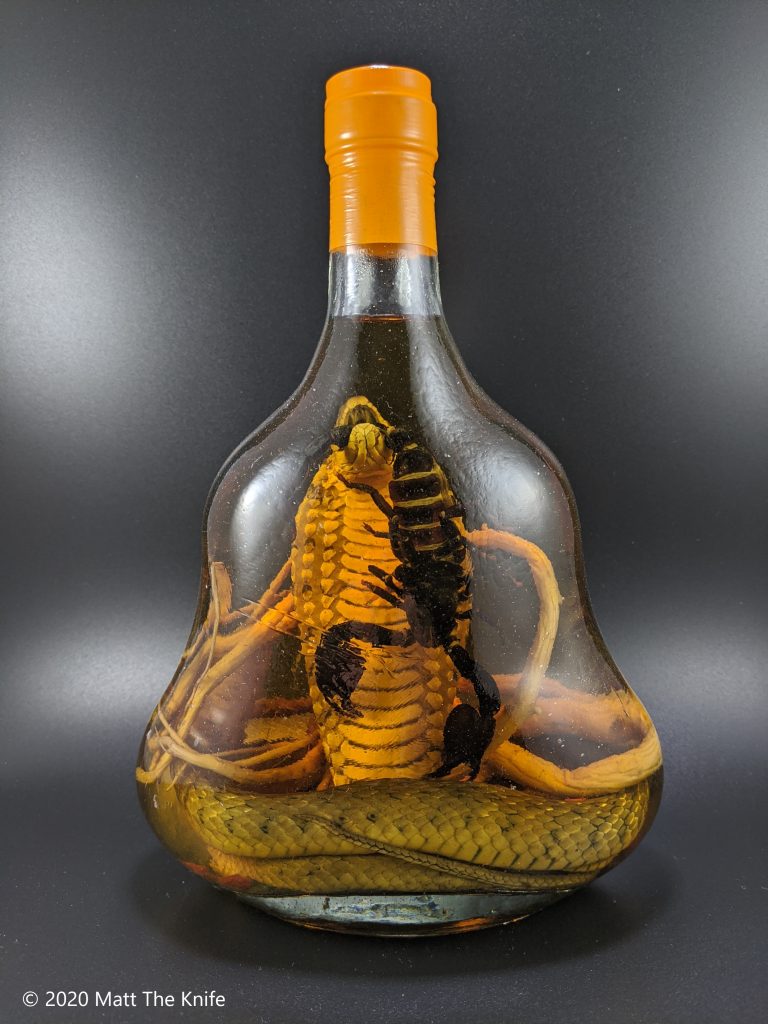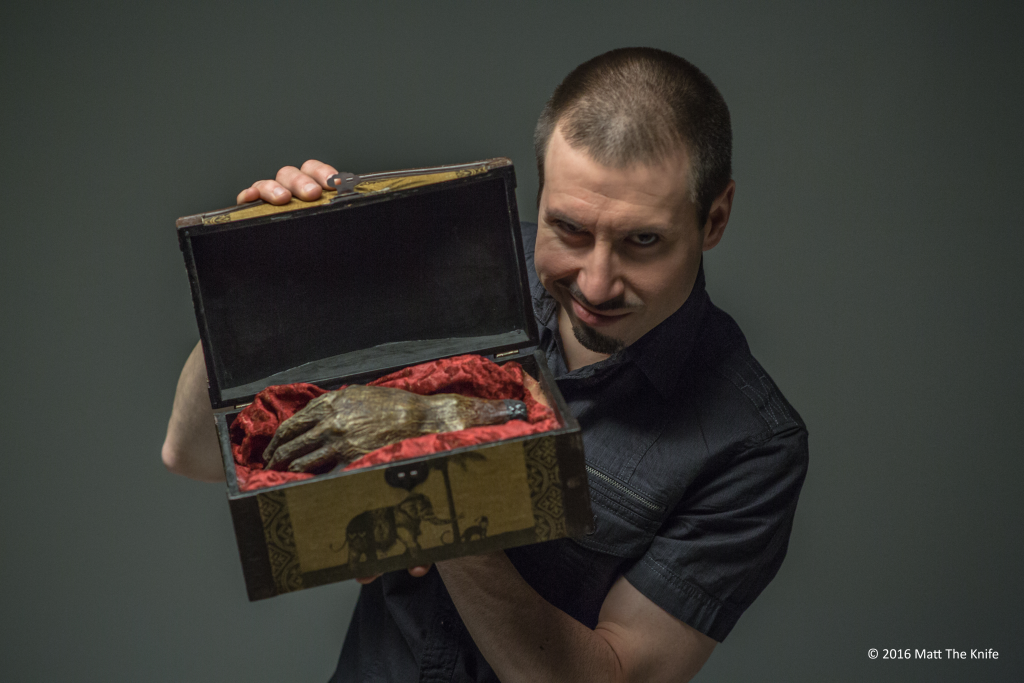Matt The Knife is a mentalist, magician, lecturer, and former conman. MTK has broken twelve Guinness World Records. When he is not traveling, he resides in Providence, Rhode Island. He is currently working on a new show, called “Possessions,” which features a collection of oddities and curiosities he has amassed over decades.
What were you like as a kid?
Well, I grew up in Rhode Island. I had a good childhood. I’m still close to my parents and my siblings. As for the crime stuff, that was all my choice. Growing up, I wanted to work in clandestine services for the CIA. Education was big in my family so I never felt guilty asking my father for a book. It didn’t matter what I was reading. As long as I would read it, my father would buy it for me. So, by the time I was about nice, I was at a high school reading level. By the time I was in middle school, I was at a college reading level. I read the Ian Fleming novels as a kid, and I decided I was going to grow up to be James Bond. My parents were oddly supportive. I started reading books about card cheating, pickpocketing, picking locks, getting out of restraints, mental manipulation, interrogation, counterintelligence, and the like because those are the skills I thought you needed to have to be like James Bond.
By the time I was 14, I still wanted to work in clandestine services but also understood that it wasn’t like James Bond. By that time I also wanted to start dating. That can get expensive when you have a small allowance. Even with my unusual skillset, you can’t get much of a job as a kid. So I got a gig in fast food. Hating every minute of it, I lasted only a few months before I quit. But one day I was at a shop, and I’m getting followed around by one of the clerks. Most people would say, “How dare you think I’m going to steal from you?” But instead, I thought, “How dare you think that if I chose to steal from you that you could catch me?”
So, I came back a couple of days later and in full view hit the place for a bunch of product.
What did you do next?
I was pleased with the outcome. So after I did that, I got involved in other things: card rings, pickpocketing, and running long and short cons as far north as Boston and as far south as New York and everywhere in between.
Were you in charge? Did you have a team?
Oh yeah, and I had teams, plural, which I ran like spy rings. Remember, the job I wanted in clandestine services was to be a “spymaster.” A spymaster will run multiple crews of spies in different regions who don’t know each other to reduce risk.. I ran the teams like I would a governmental organization because, in my mind, this was on-the-job training. I didn’t see myself as doing something inherently wrong, I guess. In a weird way, I just thought it was preparing me for the life I wanted later. I just happened to make a tidy profit along the way.
How did you find these people?
A lot of them were my friends, but for the most part it was just my network. It’s like with drugs. Drugs were never my scene, but dealing in a criminal world, you’ll find that guys who do drugs just gravitate to other guys who do drugs. Now I’m a sword swallower. Most of us know each other. It’s just a tiny group. You know what I mean? You just end up finding each other. There are people out there if you’re looking.
To what extent is conning trained vs. innate?
Anyone can be taught the basics of these scams, but if you’re going to work on my team, I’m looking for a certain internal ability. They’re just good at being a chameleon. They should be immediately likeable but instantly forgettable. They need to have flexible morals. I need them to be able to take orders well and understand my authority while at the same time being able to disregard other authority figures. Probably most important is that they should be intelligent, charming, and have the innate ability to adapt and improvise in an ever-changing environment.
So you’re saying it’s really just natural ability?
I am naturally geared towards these skills and that’s why I would have likely made a good spy. I tend to be a natural networker. I think I’m easy to get along with, and frankly, I think that most of the time I seem harmless. If you didn’t know what you knew about me, you wouldn’t think that I’m even capable of doing the things I’ve done. The best trick the devil ever played was to make you think he wasn’t real. I’m naturally disarming in that way. When people hear my stories, they think “that just can’t be true,” and I always go, “Great, that’s what I wanted.” If you saw me as a threat then I wasn’t doing my job. I don’t show up as a wolf. I show up as a sheep. If I was doing what I was trained for then I’m moving in and out of the herd, devouring sheep here and there, but always going unnoticed.
Do you play poker? Who would ever want to play with you?
I play friendly games because my friends know I won’t cheat against them, and I never would. I’ve never taken money from anyone I’ve cared about. I’ve never stolen from anyone I’ve cared about. I’ve learned over the years that everyone has their own code and that’s a big part of mine.
Do you feel like your experience with mentalism makes you better at making live reads in poker?
Yes.
Do you have any tips?
None that can be explained in a simple interview, but here’s the basic gist. Think of your closest friends, or someone you’re dating. When they’re upset, you can feel it. You can tell. Sometimes you don’t even know what it is. You might not even be able to verbalize it, but you’re picking up on nonverbal cues that you’re attuned to. I’m just better at taking in the data, compiling it, and spitting out an answer than the average person. Since I was a kid, I’ve watched people more closely than others, and eventually it became a habit. It’s a habit that my father naturally had too, so maybe it’s genetic to an extent, but a lot of it is learned and practiced behavior. When you put all of that together, a lot of the time I might not even be able to explain what it is, but I can tell.
So why did you move away from all of this into your current career?
It’s a long story. But in both the sort of criminal and governmental work that I could have gone on to continue doing, given my skill set, if I showed up to your home, to your place of business, or into your life generally, you would have had a bad day. And I didn’t like the prospect of continuing to perpetuate negative or harmful behaviors.
In the wake of that, I fell into my current career. If you told me when I was in college that this is what I would end up doing, I would have laughed at you. I didn’t know a single magic trick. But while it seems like these three things are disjointed — to go from crime to clandestine services to magic — there’s a thread that goes through all of it: secrets. The difference is that, in my first two, if I showed up, I was cultivating chaos. But with my work now, if I show up, people are happy to see me and better for the experience, and that’s a lot more gratifying.
Do you think that there are more or fewer schemes like yours today?
I think there are fewer but only because we have less interpersonal interaction today. Nevertheless, I believe there’s more crime of this type happening. Fraud is becoming so much easier in a modern world. For instance, you can get a cheap credit card skimmer. If you get a job as a waiter, a skimmer will save the data of every card that you swipe through it. This is also common in hotels because they can take your card and swipe it underneath the counter. All the hotel worker has to do is download the data when they get home. With that, they can create a new card. Anyway, my point is that technology has made this sort of crime easier and more accessible.
What are your Guinness World Records?
I’ve broken 12. It’s probably easier to give you categories — they’re in escapes, sleight of hand, fire eating and manipulation, and sword swallowing. So, I’ve broken the record in things like the fastest escape from a straightjacket while underwater, fire torch teething, things like that. I used to do them a lot as publicity stunts, but as I’ve gained more notoriety it’s a bit more difficult to find the time in my schedule to break new ones.
So what’s the deal with sword swallowing?
It’s like magic but isn’t. While magic tends to look real but is fake, sword swallowing looks fake but is all real. I realize that it sounds somewhat unbelievable to many but I’m able to turn off my gag reflex and expand my esophagus.
How do you do that?
It’s a combination of genetics in conjunction with one to three years of training. So, you have three gag reflexes. The first you’re probably familiar with from when you’re brushing your teeth. The second separates into your lungs, and the third goes into your stomach. I can turn all three off at will, and then expand my esophageal passageway, so I can swallow up to three swords at once — called a sword sandwich — although I normally just do one.
What about that trick David Blaine does where he swallows a lot of water?
That’s regurgitation. That’s also real, but I’m inclined to avoid it because I don’t do anything that can do permanent damage. So, for example, now I tend to avoid most of the fire eating stuff. I only do it when I break a record, simply because the fire won’t kill you but the chemicals will. The incendiary chemicals that you’re using are carcinogenic and quite toxic.
With regurgitation, the problem is that when you’re bringing things back up, it literally throws off the rhythm of your heartbeat and, over time, will weaken your heart. When it was an old vaudeville act, most of the guys who did it would die of heart attacks at a very young age.
Don’t get me wrong, I’m not faulting David or anyone else for doing it. That’s their choice and it can make for a real spectacle! But while I’ve absolutely put my life on the line for pieces and I’m often attracted to the danger, I’d rather put my life in danger in the moment, rather than die over a prolonged period. I’d rather be in a situation where if I live I live and if I die I die. But even that, if I’m doing it right, is all under my control.
What are your work habits?
For most of what I do in life, it’s all or nothing. I constantly feel like life is about to end. Ever since I was a child, I’ve felt like we have such a finite amount of time on Earth and it’s just ticking away, fast. I’ve always felt the need to hurry and get more done, even though I think I’ve led a pretty full life. I’ve climbed the Great Wall of China three times. I’ve been in the Great Pyramids of Egypt. I’ve performed in front of countless thousands of people, performed for crown heads of state. I’ve done some amazing things, yet I still feel like I haven’t gotten far enough. That drive is a force that makes me feel like I can’t waste time and I can’t ever stop. It makes me feel like I can never relax. Whenever people tell me that they’re bored, I’m like: “What is that like?” I just don’t have time to be bored. I would love to be bored! I’m big into lists. I have this big to-do list on my phone, and I always wonder what it would be like if I caught up one day.
Could be really depressing.
I think I would both love and be terrified to catch up. I always feel like I’m on the cusp of being overwhelmed. I’m a big skier, and the way I think of it is I’m skiing down a mountain while an avalanche is chasing me. I don’t want to go so fast that I lose control, but I need to stay fast enough to be ahead of the avalanche. There’s something both terrifying and exhilarating about that. It’s exhausting to constantly be running at that level — to keep healthy, to eat right, to exercise, to get enough sleep. I keep a very busy schedule and never feel like I’m not working. People think that I’m bursting into flames and escaping straightjackets all day. And I always say: That’s the best part of my job, but that’s the smallest part of it. The show to me isn’t work. That’s the fun part. But my work is everything else. This is all just a long way of saying that my work life is pretty similar to anyone else’s who owns a business. It’s just that my business tends to be cooler than most other businesses.
With that said, I also do plenty of things outside of magic. I spend a lot of time skiing. I’m also an elite qualifying OCR (Obstacle Course Racing) racer. I captain a team and we do military style obstacle courses all over the country. I’m a big reader and a bit of a news junkie. I think it’s important to be well rounded. All these things are very important to me. It’s a constant balancing act that even now in my life I’m trying to figure it out.
Where do you find tricks? Do you guys have a forum?
I’m sure there are sites. However, that’s not what most pros are doing. There are guys I’m good friends with, and if there are ideas I want to bounce off of them, I’ll just call them. And a lot of my people aren’t even magicians. The Internet has actually made it a lot more open than it used to be, though. There can be certain price points for buying tricks or learning tricks that can quickly get expensive for a newcomer. Frankly, if you go to Brown, you can learn magic easily because Brown has one of the best private magic collections just up the road here in the John Hay Library. It’s called the H. Adrian Smith Magic Collection. If you go to Brown, in theory, you could sit down and learn a lot of magic. There’s so much hidden away in the old books. Sure, there are newer techniques that aren’t in there, but magic is like building a house. You should learn everything foundationally before you move on to more advanced stuff.
There’s a first edition of the very first book ever published on magic written in English in that very collection, and there are only a handful of them left in the world. It’s called The Discoverie of Witchcraft. It supposedly came out during the Inquisition because this guy realized that a lot of the people who were being persecuted as witches were actually just magicians. Realizing it was all fake, he thought it was just insane that people were dying because of what were just tricks, so he wrote a book explaining how the tricks were done in order to save people. But the opposite happened. Instead, when people got the book, they started doing the tricks. The Inquisition didn’t get it. They suddenly saw even more witches everywhere, and killed more people. So, the King of England rounded up the books and burned them, which is why there are so few of them left.
But here’s the coolest part. As the legend goes, a bunch of them were smuggled out of the country, but one in particular was pulled from the fire by one of the guards, and smuggled it out. Supposedly that’s the copy in your collection.
Whoa, is it charred?
No, but people say it still smells of the smoke from the fire. It was originally owned by H. Adrian Smith who graduated from Brown and was a magician here in Rhode Island. He had a student named Edward Hill who was the head of the New England Magic Collectors. I never had a mentor to speak of, but if I had to name someone who was close one, it would have been Ed. Ed had a world renowned collection, but you’d never think that. He looked like a normal guy. He was a high school teacher, but he had everything squirreled away, and he gave me full access to his library when I was first starting out in magic. He helped to stoke the fires of my own collecting.
Do you read them all?
I’d like to tell you that I do. I read many of them, but this week alone I probably acquired twelve books, so realistically do I have the time to read all of them? No, but I hope I will. Let me put it this way. I never buy a book without the intention of someday getting to read it. My favorite thing to collect, though, is not magic. It’s oddities and curiosities. My collection is one of the largest in the world.
What kind of stuff do you collect?
I collect magic. I collect a lot of original old posters, both vintage and antique. I just got another two in last week, one from 1911 and one from 1914. I collect some physical tricks, but I’m not as interested in those because most of the good stuff that professionals used got destroyed or beaten up. If you’re a worker, you’re using these things on tour, and they don’t last. Actually, I have a piece in my collection that used to be in the Smith Collection. It’s a German spirit bell well over a hundred years old that was used in seances. I got it from Ed. I also have hundreds of magic books.
What’s your favorite item?
That’s tough… but I’m particularly fond of the heart that I keep on my desk. Here, I have some pictures on my phone.
[MTK takes out his phone]
This is real. It’s a hand which has been cured with mercury. Very, very unusual. If you shake it, it sounds like a rattle. You can actually hear the metal inside of it. That’s boring, just some Roman coins… A pig with one eye in a jar. A genetic abnormality. Oh, and this is another pig that’s siamese. Here’s the kitten with three arms. This is a carved human femur from Tibet. You can see all the dragon patterns.
Oh, here’s the thing that everybody likes! Even people who hate my collection. Universally, I’ve never had anyone dislike this. Everybody likes the cute, two-headed duckling.
Is that thing taxidermied?
Yeah, yeah. It’s real, but yeah it’s been taxidermied. However, I’ll only acquire antique and humanely sourced taxidermy as I don’t want anything to die for the sake of my collection. Ooh, this one is wild. This is a kapala. It’s Tibetan.
I’m not gonna say this one out loud but it’s pretty clear what that is.
Wow. How do you get this stuff?
I have a network of dealers and collectors. A lot of us know each other. I have people reach out to me nearly every week who are trying to sell or trade items. As a collector, I’m always looking for something new.
Okay… Mummy linens and other Egyptian items. That one is original but I also have a giant sarcophagus in my office that’s not authentic, but it’s big enough that you could climb into it. I use it as a bookcase now… Antique posters, more carved masks… Here’s a little torture thing…
This is an overmodeled human skull. It’s from one of the South Pacific Islands, and it’s what’s sometimes called an ancestor’s skull. This object would have been at a central point in the village, and would be formed from the skull of someone who had great importance to that village, such as a chieftain or shaman. Upon their passing the head would be removed, followed by the skin and muscle tissue, and finally a clay likeness would be formed over the face. This object would have been prayed to for protection and prosperity. To think there was an entire town built up around this object that I now have in my collection… it’s a real honor…
Do you have any CIA stuff?
I have some espionage items. Mostly Cold War Relics — bug devices, spy cameras, weapons. Here’s a photo of an old KGB visor from a dress uniform.
Have you ever heard of Sidney Gottlieb? If my memory serves me, in addition to running the MKUltra experiments, Gottlieb designed CIA gadgets in the 50s and 60s.
Oh, very much so. If you didn’t know this, they actually hired a magician named John Mulholland who was quite famous in his time to write a manual for MKUltra. They were supposed to either destroy or redact all the copies of the manual, but then someone, relatively recently, found a copy of the handbook in their attic. There’s a biography written about it, and you can get a copy of the manual from Amazon right now. I’ve actually lectured extensively on the topic because of my unique experience both in magic and in clandestine services.
So, what are you working on now?
Different things. Obviously, I do my stage show which mixes mentalism with stunts, sleight of hand, and comedy. Everything I do has audience participation, and I enjoy being able to do a lot of improvisation in my show because it makes things different and more fun. I also offer a lecture which combines the story of my past with tips on how to protect yourself from fraud, scams, and cons.
In my newest offering, I’ve tried to delve into darker subject material. I’ve always found religion to be a fascinating topic and I’m a big fan of Halloween. So a number of years ago I created a show titled “Epitaph.” It was a seance of sorts but I always thought of it like visiting a haunted house – only much more personal and story driven. I toured it around the country for a while, but the problem that I quickly found was that I could only do the show for small crowds. Frankly, a lot of work goes into it and it’s best experienced with no more than a dozen people in the audience. This was a cost issue given that my normal audience size is in the hundreds or even thousands.
Since then, I’ve set about creating a show for a larger audience that still involves this spiritualistic element. The name of my new show is “Possessions”, which is a double entendre because the show is both about the physical possessions in my collection as well as the concept that these objects might be possessed. In the show, I bring things from my actual collection to theaters, present the stories and the histories of them, and then the audience has ghostly interactions with the items that the story is based on. The hardest part for me has been that people often don’t believe the collection is real but obviously, it is. I realize these are unusual things to see outside of a museum so up until this show, I was always very private about my collection. I’d rarely speak about it publicly. However, I’ve begun to open up about it now that I have an appropriate vehicle to share it with my audiences.
Why have you chosen to take your act in this direction?
Magic is an artform. I suspect that one of the reasons magic isn’t as easily regarded as one is because it typically has only one note. Where a painting or a film can make you feel happy or sad, scared or uncomfortable, or make you laugh, most magic tends to only make you feel amazement, confusion, or surprise, which are all sort of branches of the same tree. Those are great and deserve to be a part of the experience – but I strive to make the magic in my shows have more notes.
So while finding someone’s card is cool, I don’t think it’s “real” magic. There’s sleight of hand in it, and I think that’s amazing and impressive, but those tricks don’t make you question reality. At least not really. You can always rationalize it away.
While I use sleight of hand, it’s a means to an end – not the end itself. There’s sort of an unspoken rule in my work that everything could be real. That’s certainly not to say that it always is – but it always could be. I think the usual question you hear people say as they leave a magic show – “How did he do that?” – is sort of a boring one. At least for me, a more interesting question to get an audience to ask is, “Was that real?!” A show that’s really edgy and dangerous makes that line fuzzy. It makes you question things, blurring the line between fantasy and reality.
